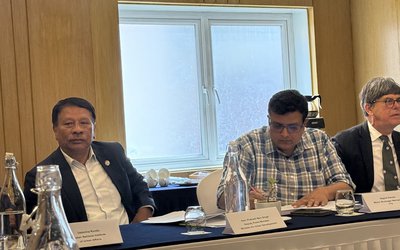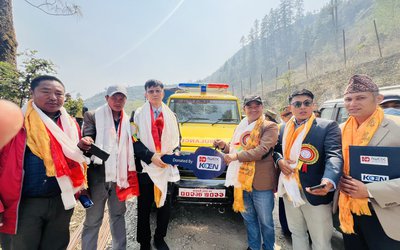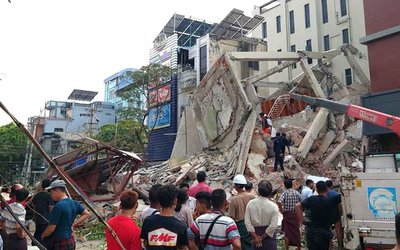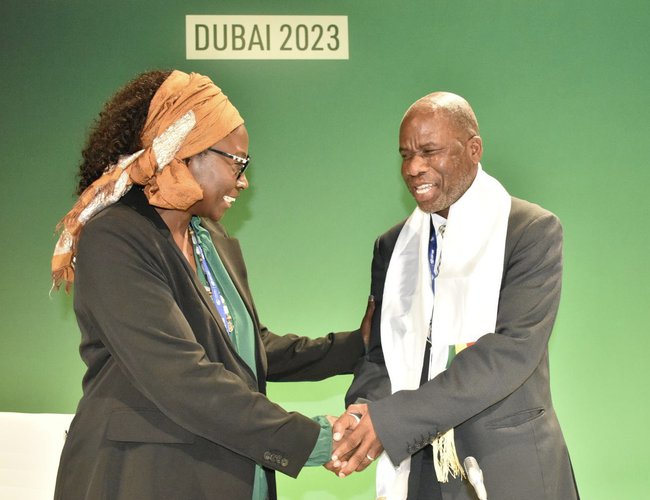
Mr. Evans Njewa, chair of the LDC Group on Climate Change for 2024 and 2025, and lead negotiator for Malawian climate change since 2005 stated the importance of water for life, impacts of climate change on water resources, and effects of extreme weather events to accelerate water-induced disasters. He reminded the decision of CoP27 and CoP28 to protect water resources and expected additional decisions in CoP29 on water security. He advised the countries to uplift this water security issue through the national climate change focal point(s) in a closeout workshop on Global Water Leadership (GWL) Program held in Malawi on 14-15 March 2024. The GWL workshop was attended by the government focal persons and GWL coordinators from the Central African Republic, Malawi, Nepal, Palestine, Rwanda, Tanzania, and Uganda. Participants assessed efforts made towards building climate resilient and inclusive water services. Mr. Njewa informed that Malawi as a chair of the LDC Group on Climate Change will host a strategy meeting in the last week of March 2024.
The LDC Group was formed in 2001.Mali, Tanzania, Bangladesh, Maldives, Lesotho, The Gambia, Nepal, Angola, Congo, Ethiopia, Bhutan, and Senegal have served as the chair of this Group till 2023. Nepal served as its chair for 2013 and 2014 and organized the strategy meeting in early 2013.The chairing country will have two years tenure, but Angola and Congo shared for one year each.
Representing the LDCs:
Parties to the UN Framework Convention on Climate Change, Kyoto Protocol and the Paris Agreement have constituted several bodies to advance the implementation of these instruments with provisions for representation from the UN regional groups (Africa, Asia-Pacific, Eastern European, Latin American and Caribbean, and Western European and Others). On climate change regime, there are several constituted bodies which are represented by the UN regional groups and negotiating blocs such as Group of 77 and China (134 developing countries), or Small Island Developing States (SIDS, 57 countries) or LDC Group (45 countries).
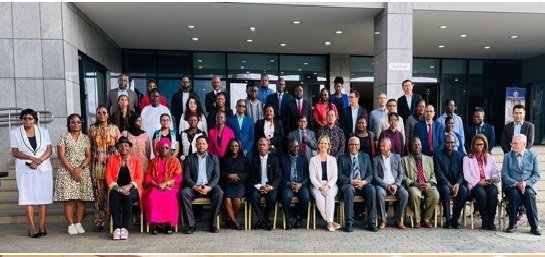
The constituted bodies where LDC Group nominates a representative on behalf of 45 LDCs are: (i) Adaptation Committee; (ii) Adaptation Fund Board; (iii) Advisory Board of Santiago Network (deals with loss and damage); (iv) Consultative Group of Experts (deals with national reporting requirement); (v) Executive Committee of the Warsaw International Mechanism for Loss and Damage associated with climate change impacts (WIM ExCom); (vi) Facilitating Working Group of the Local Communities and Indigenous People's Platform (FWG LCIPP); (vii) Green Climate Fund; (viii) LDC Expert Group (LEG); (ix) LDC Fund Board; (x) Paris Committee on Capacity Building; (xi) Supervisory Body established under Article 6, paragraph 4 of the Paris Agreement (deals with mitigation of GHGs emissions and sustainable development mechanisms); and (xii) Standing Committee on Finance. These constituted bodies have specific functions as decided by the Parties during the CoPs, CMPs or CMAs. The chair of the LDC Group communicates the nominee to the UNFCCC Secretariat after review of his/her expertise.
Of the constituted bodies, Nepal, at present, is representing the LDC Group for FWG LCIPP, Article 6.4 of the Paris Agreement, and the Adaptation Fund Board. Nepal is also representing the Asian group on LEG.
The 45th meeting of LEG was held on 20-23 February 2024 in Bujumbura, Burundi to, inter alia, develop its work program for 2024 and 2025, discuss on priority needs of LDCs for support such as to implement NAPA and NAPs, interact with Green Climate Fund Secretariat, GEF and its agencies, including others. Nepal did not attend this meeting and missed the opportunity to highlight the concerns, needs and priorities of the Asian LDCs, including Nepal, and strengthen functional relationship with designated climate funds and agencies.
Those engaged in climate change negotiations should attend sessions of the subsidiary bodies and CoPs and other meetings. Delegate must enjoy frequent travel, sometimes long waiting in transits, and be ready for meetings whole day and night depending upon the issues. Recalling my participation between 2007 and 2016, frequent travel to a trusted representative is sometimes painful. In 2014, I received 19 invitations in my capacity as the Chair of the LDC Expert Group. I prioritized meetings to support the LDCs and could manage to attend 13 meetings by even landing in Kathmandu in the morning and flying to attend another meeting in the afternoon. Few Nepalese climate negotiators have frequent travel at present. It is natural and should be promoted to develop country capacity. Participation in negotiations is not an incentive rather an obligation for the poor people.
Climate change negotiation is becoming complex and requires better understanding of the issues. For example, delegates took over a decade to decide on funding for loss and damage. It is not only necessary to build negotiating capacity, but continuation of participation counts a lot. Some climate negotiators have over two decades of experience. If Nepal wishes to develop country capacity and benefit from climate regime, a dedicated permanent team of negotiators is urgently required. The team must ensure continued participation of a diplomat with legal expertise and with subject matter expert(s).
Non-participation in events or meetings of such bodies raises questions on compliance of a trust to a country and its expert as s/he was given the responsibility to flag and negotiate on LDC issues. Hence, it is the moral responsibility of the representing country to ensure the participation of the nominee and provide logistics where necessary as s/he is representing a bloc of climate vulnerable countries and communities. The trust of a negotiating bloc must be maintained to get support on national agenda as well. Country may greatly suffer in its national issue from a negligence of non-compliance.
Strategy Meeting: To facilitate agenda-based negotiations, develop negotiating capacity, identify and priorities issues for theme-based negotiations with the developed and developing country Parties on behalf of the LDCs and workout various strategies to benefit from climate regime, LDC Group has designated 8 thematic leads (coordinators) namely on: (i) adaptation; (ii) agriculture; (iii) Article 6 (voluntary cooperation on climate targets - NDCs); (iv) capacity building; (v) loss and damage; (vi) mitigation; (vii) technology; and (viii) transparency. Co-coordinator(s) are normally selected, irrespective of the country, based on regularity in attending key negotiating sessions, expertise and interest on subject matter, negotiating capacity, willingness and health to attend even mid-night or early morning meeting(s), capacity for last-hour decision and so on.
In some cases, LDCs advise the competent negotiator to lead the theme on behalf of the LDCs. In case of representation on the constituted bodies, the climate change focal point of the interested country officially sends its interest with CV of the official to represent the LDC. The LDC chair evaluates the CV and his/her past performance on negotiation, taking note of country's interests, ensuring regional balance, and following the defined criteria, select the nominee (as required) and officially informs the UNFCCC Secretariat about the nominee. Hence, the country and the nominee are responsible to the LDCs for effective engagement in the climate negotiations. If the country does not nominate the thematic lead or chair or member of the constituted bodies, it affects all LDCs. Hence, the country and the nominee should consider it an obligation.
The strategy meeting was held at Lilongwe, Malawi on 26-27 March 2024 and it was attended by thematic coordinators, LDC Group nominated experts to different constituted bodies of the UNFCCC, KP and the PA, and designated 'elders ‘having long experience on climate change negotiations. The country chairing the LDC Group organizes the strategy meeting normally in March before the start of climate change negotiations. Such a meeting reviews outcomes of the previous CoPs, provides guidance to the theme-based lead negotiators or those representing the LDCs in the constituted bodies. The meeting helps to further understand the CoP28 decisions, and discuss on guidance and strategies for future work, particularly on its thematic areas to negotiate as LDC bloc with other negotiating blocs who are Parties to the UNFCCC, KP and the Paris Agreement. This provides sufficient guidance for climate negotiations in 2024.
As a chair of the Global Coordination Bureau of the LDCs, Ambassador and Permanent Representative of Nepal to the United Nations, Mr. Lok Bahadur Thapa addressed online the Strategy Meeting on 26 March 2024. Mr. Thapa 'underscored the need to have decisive actions to limit temperature rise and bridge significant gaps in climate finance'.
Nepal's Representation:
Nepal has represented and may represent the LDCs, Asia and the Pacific region, and Group of 77 and China in climate negotiations. In recent years, discontinuation of Nepali delegate(s) in negotiations has made our participation comparatively weak in developing government and/or country capacity.
Between 2008 and 2016, Nepal offered its service as a rapporteur to the Subsidiary Body for Scientific and Technological Advice (SBSTA) from Asia-Pacific group in 2008, chairs of the LDC Group for 2013 and 2014, LEG for 2014 and 2015 representing Asian LDCs, and Adaptation Fund Board representing the LDCs in 2016. The administration of the then Ministry of Environment timely nominated its officials to attend each session and meeting of the UNFCCC and constituted bodies. In 2018, the government decided to dissolve the then Ministry of Population and Environment and merged the environment and climate change with forests by naming the Ministry of Forests and Environment. Since 2017, Nepalese engaged in climate change negotiations and serving as the representatives of the LDC Group or Asian Group started facing challenges for participation.
Institution and leadership: Recalling institutional development on the environment and climate change, the Government of Nepal renamed the Ministry of Forests and Soil Conservation (MoFSC) in 1992 into the Ministry of Forests and Environment (MoFE) and again renamed as MoFSCin 1993 by establishing the Environment Protection Council. It happened so as MoFE could not deliver on environment conservation and limited its activities on forests. Cross-cutting nature of the environment was neither understood nor did it coordinate multi-sectors. In September 1995, the Government established the Ministry of Population and Environment (MoPE) with defined functions by considering the environment a cross-cutting area that requires joint and collaborative efforts of multi-stakeholders. The MoPE survived for a decade, grounded the need for environment conservation in several policies, plans and programs, and was merged with science and technology in 2005. Merging and separating environment continued till 2018 and the government finally renamed MoFE like in 1992.
Recalling the human resources, programs and budgetary provisions, the then Ministry of Environment worked as a dedicated ministry and discharged its functions effectively during the last two decades. When MoFE was renamed, environment and climate change - the cross-cutting and nationally and internationally prioritized themes - started enjoying the 'shade effect' of a big tree. Country needs and priorities on climate change were overlooked, diluted, and undermined, including the multi-dimensional and multi-disciplinary initiatives required to address environment and climate change challenges.
Reviewing the administrative leadership, environmental secretaries were and are foresters from research service for about the last 12 years. Nearly a decade, national needs and priorities on the environment and climate change were overlooked in many cases. Impractical legal provisions such as on environmental assessment, ambitious national and international commitments on climate change, and carbon trade, looking environment and climate change through a single sector 'eye' reduced opportunities and benefits from change negotiation processes.
Considering the state of forests, conservationists in 1993 advocated then MoFE that those who could not win the battle (of forest management) is again sent to fight with the environment battle. This resulted to rename the then MoFE to MoFSC. Environment and climate communities are recalling the institutional responses of 1993 as leadership has greater role in responding the key barriers, facilitating the processes, acknowledging the good works, developing the capacity at institutional, individual, and country levels, accessing and mobilizing resources for the cause of climate vulnerable communities and natural resources such as water and biodiversity, and so on.
Recalling the ground-breaking works on climate change during 2009 to 2016, and report prepared and published between 2017 and 2023, time has come to rethink the institutional arrangement on the environment and climate change. During 2009 and 2016, Nepal prepared National Adaptation Program of Action (NAPA), and a national framework on Local Adaptation Plan for Action (LAPA) to localize adaptation activities, formulated climate change policy with provision for mobilizing at least 80 percent of the total fund for rural level climate change activities, accessed and mobilized over US$ 200 million for implementation of climate adaptation and resilience activities, channeled climate finance through a climate change budget code, launched, inter alia, Nepal Climate Change Support Program - a flagship program also recognized under the Nairobi Work Program in 2015in Paris, and led and contributed in climate negotiation process by being the chairs of the LDC Group for 2013 and 2014, LDC Expert Group for 2014 and 2015, and Adaptation Fund Board for 2016.
Between 2017 and 2023, the government re-issued climate change policy and LAPA in 2019, included climate change provisions in the Environment Protection Act (2019) and its Rules (2020) by making the carbon trade complicated and 'non-functional', accessed about
US$ 92 million, including for readiness activities from Green Climate Fund, prepared National Adaptation Plan (2021-2050), and submitted a highly ambitious Nationally Determined Contribution (NDC) in 2020, prepared long-term strategy for net zero emissions, national framework on loss and damage in 2021 and NDC Implementation Plan in 2023, and has mobilized resources to piloting climate adaptation activities in few municipalities.
Taking note of environmental stewardship, climate negotiation process over a half-decade, challenge in managing cross-cutting issues by a sector, and accelerated climate- and water-induced disasters, national priorities and international obligations on the environment and climate change, time has come to establish a new institution to address environment and climate change challenges through cross-cutting approaches.
Recently, climate communities are reviewing a preliminary draft Bill on Climate Change. The Bill provisions for establishing a National Climate Authority, a broad representation-based National Climate Council under the chair of the Prime Minister, and proposed provisions on climate change mitigation and budget, GHG emission reduction targets, carbon trade, climate change fund, formulation of mitigation and adaptation plan, safety of physical infrastructures and investment protection from climate change, and international cooperation and collaboration. There are several provisions that require extensive consultations to make the provisions country-specific and to respond national needs and priorities, promote socio-economic and infrastructure development climate-smart and inclusive, avoid and/or minimize conflicts with the existing policies, legal provisions and coordination mechanisms with clarity on fundamentals, including climate science, and prioritization of greatly affected economic and infrastructure sector for immediate investment, including from climate finance.
Taking note of the proposed Authority, it is high time to establish the Ministry of Environment and Climate Change by rearranging the existing dedicated departments and divisions on environment and climate change without any additional administrative and budgetary liabilities to the government to benefit from environment conservation and climate change regime. It will greatly contribute to timely address the recent concerns and commitments of the government on climate change.
As of now, trust of the 45 LDCs on climate change negotiations and support from friendly countries and multilateral institutions is encouraging. In view of the political commitment shown in Dubai during CoP28, the Government of Nepal is encouraged to develop 'country capacity' to access and mobilize resources for the benefit of the poor and climate vulnerable communities and promote environment-friendly and climate resilient social and economic development through institutional rearrangements on environment and climate change to the earliest possible.

Batu Uprety
Former Joint-Secretary and Chief of Climate Change Management Division, Ministry of Environment (then), and former Team Leader, National Adaptation Plan (NAP) formulation process. E-mail: upretybk@gmail.com
- Sagarmatha Sambad: Likely Bearing the Fruits
- Mar 27, 2025
- Decadal Experience In Preparing The NDC
- Mar 03, 2025
- Over Five Decades Of Concern On Air Pollution
- Jan 16, 2025
- Damaging The Functional EIA Track
- Dec 22, 2024
- Baku CoP29 Outcomes And Nepal's Initiatives
- Nov 26, 2024



